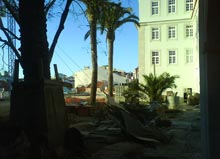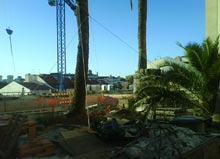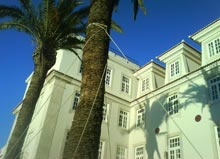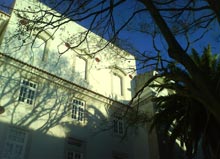| Convento dos Inglesinhos
Travessa dos Inglesinhos 46 / Rua Luz Soriano
Bairro Alto / 5 minutes from Principe Real An architectural work built in the second quarter of the 17th century, St, Peter and St. Paul's College, known as Convento dos Inglesinhos, represents a vestige of the subsisting cultural and spiritual link between Portugal and England, in the course of History. lt is in the midst of an atmosphere of social and religious struggles that, throughout the first half of the 17th century, the initiatives to protect the English catholics living in Portugal and simultaneously to intensify and consolidate the faith threatened by the reformation movements, appear. Undoubtedly, that was the spirit that impelled D. Pedro Coutinho when he decided to have this Seminary built in Lisbon in order to receive priests and students, all of them worthy, good natured and intelligent young men, which would later return to England to consolidate catholicism. According to the decision issued by Pope Gregorious XV. St. Peter and St. Paul's College was settled, by the end of 1622, at the top of St. Catarina hill, during a petiod of great development in west Europe as far as maritime trade centres are concerned. Father Nicholas Ashton, chaplain of the English colony in Lisbon and friend of the foundcr Pedro Coutinho, made the first effort to organise the Collcgc. Reverend Joseph Harvey was appointed first president, but it was only under Thomas Blacklow's direction that the college opened its doors to the first ten seminarists, coming from Douai. The distinguished St. Peter and St. Paul's College received not only prominent figures of the Counter Reformation, among which Father William Lloyd and Father Thomas Blount, but also remarkable leaders, such as Dr. Russel, which in 1660, contributed to the reestablishment of the diplomatic alliance between both countries. The founder of St. Peter and St. Paul's College, buried in the main chapel, early expressed, through testamentary vows, the will that the building should be protected by Santa Casa da Misericórdia de Lisboa. This way only materialized in 1982, when the Institution bought the property. The earthquake of 1755 greatly affected the building, giving rise to some reconstruction and restoration work in the late 18th century, which changed its original conception. Protected in the surrounding area by a high wall, the complex has sober convent-like-façades embrasures decorated with heavy framework, guillotine-like windows, some of them protected by wrought iron grilles. The façade of the church is simple, with an inscription and a coat-of-arms on the portico, two windows with grilles and, at the top, a round window open on the pediment. The interior of the church is vast, closed with a round vaulting, blending well two choir balconies and in the chancel there is a central throne, four niches and a round stained glass on the pediment. Walls and ceiling are decorated with stucco imitating mable and the pavement is made of stone and wood planks. The vestibule, the main staircase and the refectory are adorned with glazed tiles of very good artistic quality and great decorative interest.The object of reopening to the public of St. Peter and St. Paul's Collage is to stress „o renascer de um espaço“ (the rcvival of aspace), that is the starting point for further works of
rehabilitation and vivification of this patrimonial complex, which has undergone, along the years, a process of deterioation and several alterations. The Convent was transformed into condominiums in the past years and is now one of the most fashionable adresses in Lisbon.
Contact: Chamartin real estate, Phone: 218912425 |  | | |  | |  |  | | |  | |  | | |
